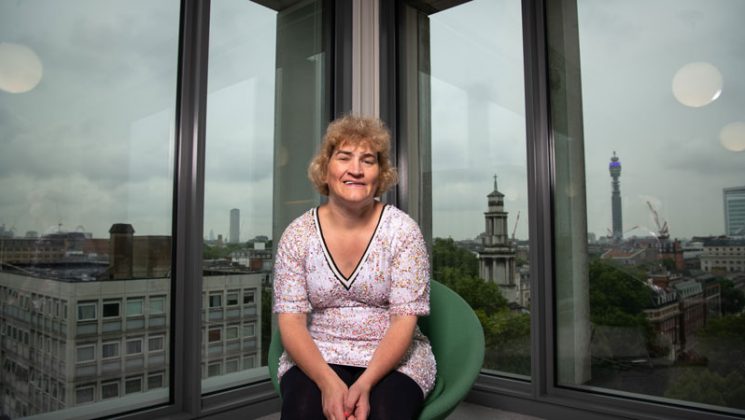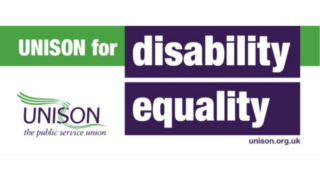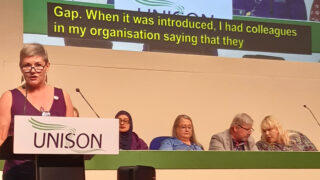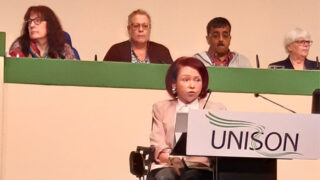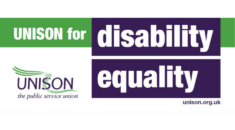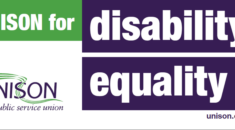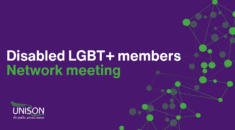Kathleen Kennedy’s busy life belies narrow-minded assumptions about disabled people
When people meet Kathleen Kennedy for the first time they often think she has learning difficulties. In reality, she has a degree in business and is the author of two books.
Having a disability throws up many problems in the workplace, largely around the assumptions that other people make. But UNISON disabled members are working together to tackle those assumptions.
Kathleen is 43 and lives independently in Aberdeen. She is a support assistant for her local council, and is the vice-chair and equality officer at her UNISON branch, as well as being on the national disabled members’ committee. She also has cerebral palsy and arthritis, and experienced “a little stroke” two years ago.
She is used to dealing with the assumptions that people make. She recently had a shop assistant tell her that it’s nice she “managed to get out the house today”, to which she responded “I work full time!” She sees the funny side. “Although life can be hard, it’s quite funny when that happens. I just think to myself, I’ve got my own car!” People assume she can’t do many things, and yet every week she goes horse riding.
Kathleen’s been employed since she was a teenager, but it was hard to get that first job. “I started out shredding paper and licking stamps on envelopes, but it got me in the door.” She has a degree in business from the Open University, and has written two books about disability, and yet she has struggled to further her career, because potential employers have a limited idea of her capabilities.
While Kathleen’s disability is apparent, there are people with so-called ‘invisible disabilities.’ These can range from dyslexia to chronic pain, and people experiencing these often face a different kind of assumption – that they don’t have a real disability, because it can’t be seen.

Jackie Taylor (above) is a UNISON member who has dyslexia. Her condition was only diagnosed five years ago, and helped explain why she struggled academically in school, and why to her it always seemed like words moved around on the page.
Because dyslexia isn’t visible to others, Jackie often has to make it clear to other people. She explains that she has sat in presentations at work and been unable to read them because of the design. “I take a deep breath, and think ‘I’m sure I’m not the only one in the room who can’t see this’. And then I’ll actually say, ‘I cannot see what you’ve put up there.’”
Like Kathleen, in many ways being disabled hasn’t held Jackie back. In fact, it could be said that it has made her better at what she does. She is a local councillor, and is particularly attuned to people experiencing difficulties with reading, as she has.
Jackie recently supported a woman who was trying to navigate the social care system on behalf of her older husband. The woman wanted to help her husband, but the couple kept missing appointments and ignoring letters. Sitting in their home, Jackie realised she wasn’t able to read. “I’m watching the wife on my periphery, she’s just outside the doorway, and instinctively I knew that woman couldn’t read, and I actually believe that it’s because of my own experience that I’m able to tap into things like that.”
Another assumption disabled people have to deal with is managers believing they will take a lot of time off sick.
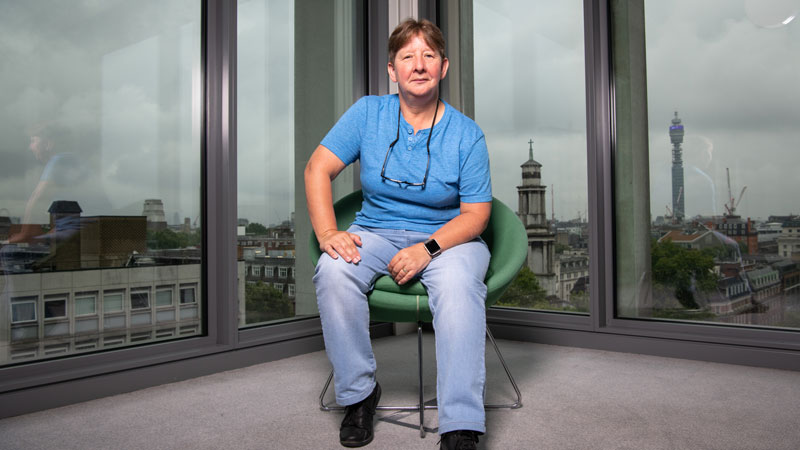
Pauline Cole (above) is a house keeper on a hospital ward in Blackpool. She has arthritis, dyslexia and visual impairment. She had to have time off once for her back pain, “but from that day to this I’ve never been off sick in 20 years as a disabled person.” Kathleen says the same thing. “People expect disabled people to be off sick a lot. Because you’re disabled that doesn’t mean you’re sick.”
There are disabled people who do need time off work, of course, and those people are entitled to it. Under the Equality Act, it is the legal responsibility of employers to make ‘reasonable adjustments’ to allow disabled staff to do their work. The problem is that many disabled people end up battling their employers for these important adjustments.
Colette Elizabeth (below) is a UNISON member working in the NHS who has a very dramatic story behind her spinal injury. She was in New York in 2012 when Hurricane Sandy hit the city, and she was thrown against a wall by the full thrust of the tropical winds.
When she got home, Colette went straight back to work, but after several months realised she could no longer ignore the pain in her legs and back, or the hearing problems she had developed.

It turned out she had damaged five discs in her spine and also had nerve damage. The injury means she now must have an injection in her spine every six months, to decompress her spinal cord. Her employer was not supportive of her having time off for the procedures, so Colette had to stand up for herself – making sure she understood the policy well, so that she could effectively point out that she was entitled to it.
“I’m not backwards in being forwards,” she says. “If something needs to be said or an issue needs to be raised, I’m the one that’s reporting it.” She now fights to support other colleagues going through similar ordeals.
Another battle that many people face is getting their employer to support their application for ‘access to work’ grants. These government grants are part of a scheme to provide disabled people with equipment to help them at work, such as supportive chairs, or specific types of keyboards.
Colette found that after she had been assessed and deemed eligible, her employer did not order the equipment she needed. Again she refused to take the set-back lying down, and eventually asked of her boss: “Are you trying to stall me and prevent me from doing my job? Because that’s harassment and victimisation and I won’t stand for it at all.” Eventually she was provided with the equipment to do her job.

Disabled people face more snakes than ladders in the employment world
Jackie Taylor has heard from other disabled workers that they have had to wait a long time for equipment to be ordered. She thinks that sometimes managers don’t want to admit they don’t know how to go through the process of applying for the grants. “It would be good if managers actually said, ‘I don’t know, but I’m going to find out.’”
She thinks there can be a darker reason, too, for stalling: “It’s also a way of pushing people out.”
From assuming they are not able to work, to assuming they don’t need time off, disabled people face incorrect assumptions every day. And these assumptions have a damaging impact on their ability to do their jobs and live their lives. If there’s one message coming from UNISON disabled members loud and clear, it’s not to jump to conclusions about other people.
The good news is that such assumptions don’t stop members like Kathleen living their lives to the full. This month Ms Kennedy is off travelling around Vietnam and Thailand – giving a whole new meaning to “getting out of the house.”
Words: Rachael Henry and Rosa Ellis
Images: Steve Forrest

